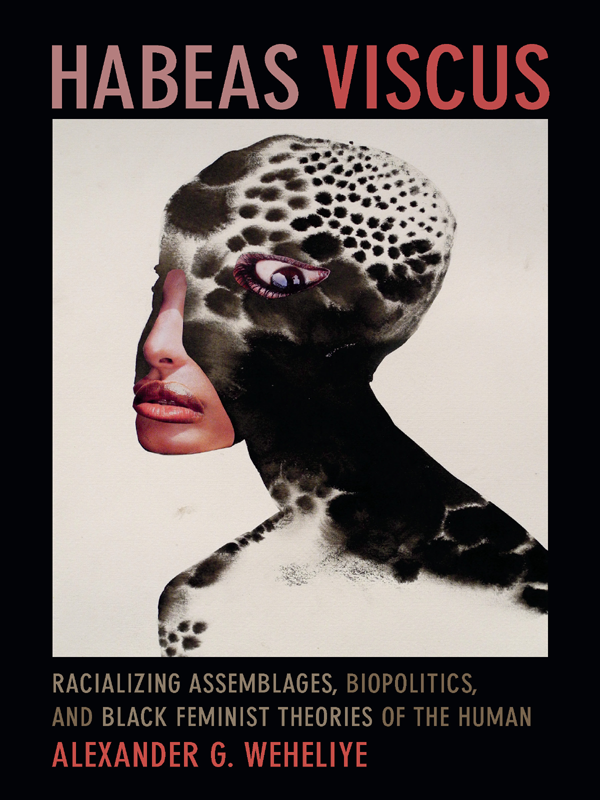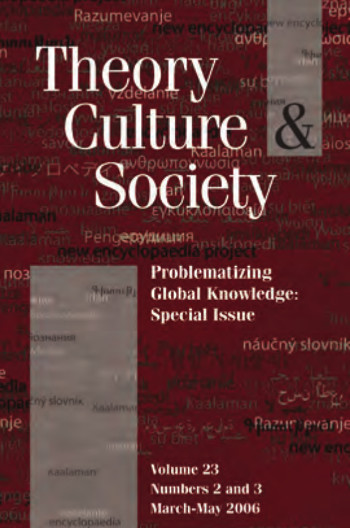Alexander G. Weheliye: Habeas Viscus: Racializing Assemblages, Biopolitics, and Black Feminist Theories of the Human (2014)
Filed under book | Tags: · assemblage, bare life, biopolitics, black people, feminism, freedom, human, property, race, racialization, racism, slavery, theory

“Habeas Viscus focuses attention on the centrality of race to notions of the human. Alexander G. Weheliye develops a theory of ‘racializing assemblages,’ taking race as a set of sociopolitical processes that discipline humanity into full humans, not-quite-humans, and nonhumans. This disciplining, while not biological per se, frequently depends on anchoring political hierarchies in human flesh. The work of the black feminist scholars Hortense Spillers and Sylvia Wynter is vital to Weheliye’s argument. Particularly significant are their contributions to the intellectual project of black studies vis-à-vis racialization and the category of the human in western modernity. Wynter and Spillers configure black studies as an endeavor to disrupt the governing conception of humanity as synonymous with white, western man. Weheliye posits black feminist theories of modern humanity as useful correctives to the ‘bare life and biopolitics discourse’ exemplified by the works of Giorgio Agamben and Michel Foucault, which, Weheliye contends, vastly underestimate the conceptual and political significance of race in constructions of the human. Habeas Viscus reveals the pressing need to make the insights of black studies and black feminism foundational to the study of modern humanity.”
Publisher Duke University Press, Durham, 2014
ISBN 9780822356912, 0822356910
x+209 pages
Reviews: Ashon Crawley (LARB, 2015), Marianna Szczygielska (Parallax, 2015), Aditi Surie von Czechowski (Comp Stud South Asia, Africa and Middle East, 2015), Marianela Munoz and Charles Holm (Afro-Paradise, 2015), Megan H. Glick (Hypatia Rev, 2015), Shelleen Greene (Somatechnics, 2016), Amber Jamilla Musser (philoSOPHIA, 2016), Gabriela Radulescu (Allegra Lab, 2016), Ander Mendiguren Nebreda (Athenea Digital, 2017, ES).
Comment (0)Theory, Culture & Society 23(2-3): Problematizing Global Knowledge (2006)
Filed under book, journal | Tags: · aesthetics, archive, assemblage, body, classification, culture, encyclopedia, globalisation, information, knowledge, knowledge production, language, library, life, logic, media, modernity, network, public sphere, race, religion, science, space, technology, theory, time, translation, university, vitalism

In this special issue the TCS editorial board, along with colleagues in East and South-East Asia and other parts of the world, ventured in ‘encyclopaedic explorations’ in order to “rethink knowledge under the impact of globalization and digitization. The issue features over 150 entries and supplements on a range of topics which are addressed in terms of their relevance to knowledge formation, by contributors writing from a wide range of perspectives and different parts of the world. The entries and supplements are gathered under three main headings: metaconcepts, metanarratives and sites and institutions.”
Edited by Mike Featherstone, Couze Venn, Ryan Bishop and John Phillips, with Pal Ahluwalia, Roy Boyne, Beng Huat Chua, John Hutnyk, Scott Lash, Maria Esther Maciel, George Marcus, Aihwa Ong, Roland Robertson, Bryan Turner, Shiv Visvanathan, Shunya Yoshimi
With an Introduction by Mike Featherstone and Couze Venn
Publisher Sage, 2006
616 pages
Tony D. Sampson: Virality: Contagion Theory in the Age of Networks (2012)
Filed under book | Tags: · affect, assemblage, biology, biopower, capitalism, contagion, memes, memetics, networks, politics, sociology, theory, unconscious, virality, virus

“In this thought-provoking work, Tony D. Sampson presents a contagion theory fit for the age of networks. Unlike memes and microbial contagions, Virality does not restrict itself to biological analogies and medical metaphors. It instead points toward a theory of contagious assemblages, events, and affects. For Sampson, contagion is not necessarily a positive or negative force of encounter; it is how society comes together and relates.
Sampson argues that a biological knowledge of contagion has been universally distributed by way of the rhetoric of fear in the antivirus industry and other popular discourses surrounding network culture. This awareness is also detectable in concerns over too much connectivity, such as problems of global financial crisis and terrorism. Sampson’s “virality” is as established as that of the biological meme and microbe but is not understood through representational thinking expressed in metaphors and analogies. Rather, Sampson interprets contagion theory through the social relationalities first established in Gabriel Tarde’s microsociology and subsequently recognized in Gilles Deleuze’s ontological worldview.
According to Sampson, the reliance on representational thinking to explain the social behavior of networking—including that engaged in by nonhumans such as computers—allows language to overcategorize and limit analysis by imposing identities, oppositions, and resemblances on contagious phenomena. It is the power of these categories that impinges on social and cultural domains. Assemblage theory, on the other hand, is all about relationality and encounter, helping us to understand the viral as a positively sociological event, building from the molecular outward, long before it becomes biological.”
Publisher University of Minnesota Press, 2012
ISBN 0816670056, 9780816670055
235 pages
Review: Jussi Parikka (Theory, Culture & Society)
Book video (University of Amsterdam students)
Author’s research blog
Publisher
PDF, PDF (updated on 2017-9-29)
Comments (2)
